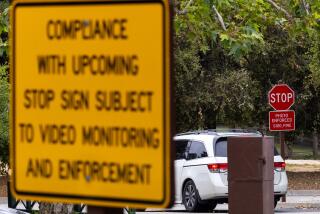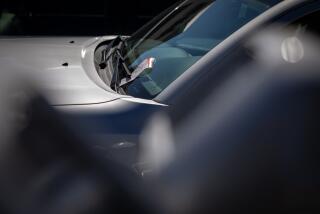Diplomatic Scofflaws Told to Pay Parking Tickets or Lose Aid : Immunity: For years, most envoys, families and staffs have assumed that traffic laws did not apply to them.
WASHINGTON â A blue Chevrolet glides to a stop in a downtown bus zone. The driver, a neatly dressed man in a dark suit, nods at the city parking-enforcement aide handing out tickets and walks into the Russian Embassy.
Meter enforcer Charles Combs nods back and slaps a $50 ticket on the Chevy.
In the next half-hour, Combs will give out nearly $300 worth of tickets to illegally parked embassy cars. It is a routine that Combs follows with little variation, even though until recently heâs known that the chances of the embassy ever paying the fines have been remote.
âIâm just doing my job,â he says. âItâs up to somebody else to collect them.â
For years, most diplomats, their families and staffs have operated in the United States on the assumption that diplomatic immunity means never having to pay a parking ticket.
Washingtonâs Department of Transportation figures the city is owed roughly $6 million in fines and penalties for unpaid tickets handed out to vehicles from more than 160 embassies over the last three years.
New York City police last year plastered 133,227 tickets on cars from foreign consulates and United Nations missions, only to see 94% of the citations dismissed.
But the balance of power in this standoff is being tipped. Congress recently directed that a portion of U.S. foreign aid be withheld from countries that ignore parking fines, and the State Department announced a plan to revoke the official license plates of diplomatic scofflaws.
By far the leading culprits are the countries of the former Soviet Union. As of last July, their representatives in Washington had ignored 73,797 tickets, carrying fines of nearly $3.9 million.
Five other Washington embassies have more than 1,000 outstanding tickets: Nigeria, Egypt, South Korea, Zimbabwe and India. Thirteen others have more than 500 each. The worst single offender in New York is a car registered to Nicaragua, which had accumulated 293 tickets at last count.
âDriving is a privilege, not a right, no matter what country the driver comes from,â insists Joseph DePlasco, a spokesman for the New York Department of Transportation.
New Yorkâs commissioner of transportation, Lucius Riccio, puts it more bluntly: âThe âfreeâ in the Free World does not refer to parking.â
Foreign embassies do not see things the same way. Russians complain that they have only five spaces reserved on the street in front of their embassy not far from the White House, but about 40 cars to park each day.
âIn Moscow,â Russian Embassy spokesman Vladimir Derbenev said, âthe American Embassy has a free parking lot and the police do not give tickets to diplomatsâ cars.â
Caught in this cross-fire is the U.S. State Department.
It is sympathetic to the problems of hard-pressed local authorities and is trying to help them collect the overdue fines. At the same time, it recognizes the importance of diplomatic immunity, the principle that provides representatives of foreign governments freedom from criminal prosecution.
âIt is essential for diplomats to be able to function without fear of harassment or consequences,â explains a State Department official. âThey need this protection to communicate freely--about trade, war and peace, every conceivable matter.â
U.S. envoys receive reciprocal protection in their overseas posts, although the State Department expects them to pay their own parking tickets.
The principle of diplomatic immunity is rooted âdeep in antiquity,â according to Peter P. Hill, professor of history and a specialist in international affairs at George Washington University in Washington.
âWhen kings sent emissaries, they wanted them to be secure. An ambassador should be immune from any local legislation that would inhibit conducting his countryâs business with another government.â
The Vienna Convention of 1961, which codified the rules of diplomacy for the first time, says that diplomats are supposed to obey the laws of the countries where they work, but makes them largely immune from arrest or prosecution if they donât.
Members of the diplomatic community in the United States have gone free after being accused of shoplifting, rape, a nightclub shooting and other felonies, although in many of those instances, they have also left the country.
No one is going to be declared persona non grata for ignoring parking tickets. But as the number of offenses soars, so does public irritation, along with demands to do something. New Yorkers have applauded as tow trucks hauled off illegally parked diplomatic cars that blocked traffic or posed a âhealth and safety hazardâ at a fire hydrant or bus stop.
The State Department, embassy representatives and local officials have tried for years to find a compromise to the parking dispute.
Negotiations finally produced a plan under which the State Department will revoke the official red, white and blue diplomatic license plates of countries that donât pay their fines. Expected to go into effect early this year, the strategy is welcomed by both Washington and New York officials.
âIt is a timely and effective way of collecting fines,â said Richard Hebert of the D.C. Department of Public Works.
But Sen. Jesse Helms (R-N.C.) complains that the proposal is âlike flogging (diplomatic scofflaws) with a wet noodle.â Helms co-sponsored the law that calls for reducing U.S. foreign assistance to any country with unpaid parking tickets. The cut in aid would equal the amount the foreign government owed in overdue fines, plus a 10% penalty.
Skeptics point out that this applies only to Washington parking fines and will be useful only against countries that receive U.S. aid. In addition, they worry about retaliation. A few years ago, when D.C. police started a parking crackdown, a squad of motorcycle policemen in Manila ticketed 87 Americans in one day for moving violations near the U.S. Embassy to the Philippines.
Since the new law took effect, one major scofflaw country, Israel, has paid off its debt.
The chief target of the law, Russia, has not. But, noting that âour countries are friends now, so we should resolve this in a friendly way,â Derbenev said his embassy is ready to help find a diplomatic solution to this undiplomatic squabble.
More to Read
Sign up for Essential California
The most important California stories and recommendations in your inbox every morning.
You may occasionally receive promotional content from the Los Angeles Times.










